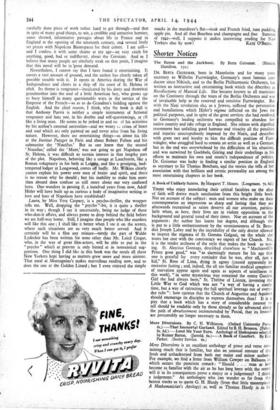,_onginans. 7s. 6d.) THOSE who enjoy immolating their critical faculties
on the altar of fifth will derive much satisfaction from this bright little book. Not on account of the subject: men and women who make on their contemporaries an impression so sharp and lasting that they are afterwards recognised as saints deserve all our attention, particu- larly when, as here, their lives are in violent opposition to the background and general trend of their times. Nor on account of the argument: the author has learnt her dogma, and although she is put to a little embarrassment by the verminousness of St. Bene- dict Joseph Labre and by the incredulity of the only doctor allowed to inspect the stigmata of St. Gemma Galgani, on the whole she states her case with the consistency we expect of her Church. No, it is the tender archness of the style that makes the book so test- ing. St. Aloysius Gonzaga, described elsewhere as " Machiavelh's Prince gone good," was "so alarmingly mature for his age that one is grateful for every reminder that he was, after all, just a kid," St. Rose of Lima, dying in agony (caused apparently by excessive fasting ; and, indeed, the all too familiar medical symptoms of starvation appear again and again as aspects of saintliness in this work), "in some mysterious way remained the sunny Garden Girl she had always been," St. 'Therese of Lisieux, inventing the Little Way to God which was not "a way of having a comfy time, but a way of extracting the full spiritual leverage out of every- day rubs ": how curious that the Church of Augustine and Aquinas should encourage its disciples to express themselves thus! It is 3 pity that a book which has a story of considerable interest IC) tell should be readable only by those already so far advanced along the path of abrutissement recommended by Pascal, that its lessons are presumably no longer necessary to them.


























 Previous page
Previous page